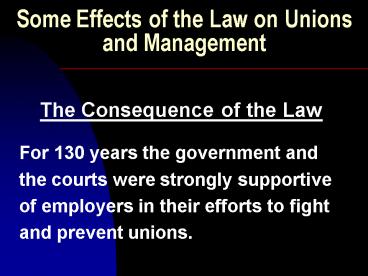Some Effects of the Law on Unions and Management - PowerPoint PPT Presentation
Title:
Some Effects of the Law on Unions and Management
Description:
Accommodation. Cooperation. CONFLICT. Strong opposition. Active discrimination ... ACCOMMODATION. Accepts union as legitimate and seeks the best possible relationship ... – PowerPoint PPT presentation
Number of Views:70
Avg rating:3.0/5.0
Title: Some Effects of the Law on Unions and Management
1
Some Effects of the Law on Unions and Management
- The Consequence of the Law
- For 130 years the government and the courts were
strongly supportive of employers in their efforts
to fight and prevent unions.
2
THE CONSEQUENCE OF THE LAW
- However, despite anti-union activities of the
courts and the government, strong unionization
did develop and become accepted in a number of
industries.
3
THE CONSEQUENCE OF THE LAW
- The Wagner Act established a positive Public
Policy environment for unions, - Taft-Hartley was enacted to counter some of the
perceived over-correction of the Wagner Act.
4
THE CONSEQUENCE OF THE LAW
- Much of the Actual Interpretation and
Application of These Two Acts is Left to the NLRB
and the Courts - Who do More to Determine the Impact of the Law
Than the Words of the Legislation.
5
REGULATION OF CERTIFICATION CAMPAIGNS
- 30 Interest - of employees in a
- unit appropriate for collective
- bargaining
- The appropriate unit is determined
- by the NLRB
- The larger the unit the less likely
- the union will prevail
6
NLRB ESTABLISHES THE RULES OF CONDUCT
- Excelsior lists
- Threats and promises
- Forged documents
- Cannot reproduce copies of the
- official ballot
7
NLRB ESTABLISHES THE RULES OF CONDUCT
- Racial, religious, and ethnic
- slurs
- 24 Hour Speech Rule
- Captive audience speeches
- Delays favor management
8
THE LAW and BARGAINING POWER
- There is a Right to Strike
- AND
- Concurrently there is a Right to
- Operate during a strike with
- replacement workers
9
THE LAW and BARGAINING POWER
- The Standard Power Relationship in Collective
Bargaining - IS
- The Effective Primary Strike
10
THE EFFECTIVE PRIMARY STRIKE
- Complete shutdown
- No work, no production
- Cost high to both sides
11
THE PARTIAL STRIKE
- The Use of replacement workers
- Slowdowns
- Off-Again-on-Again Strikes
12
LOCKOUTS
- Management's strike
- Limited legal use
- Current environment favorable
13
SECONDARY BOYCOTTS
- A Boycott normally refers only to the withholding
of purchases or sales of commodities.
14
SECONDARY BOYCOTTS
- A Secondary Boycott is conducted indirectly
against the primary party through action against
some other Third party. - They Are Illegal
15
SECONDARY BOYCOTTS
- Informational picketing is allowed
- NLRB files all Secondary Boycott
- actions for employers
16
SECONDARY BOYCOTTS
- Damage suits for unfair practices work in one
direction only - Employers
17
PICKETING
- Legalized by Norris-LaGuardia
- Adjunct to other organizational or
- bargaining tactics
- Keeps out line-crossers
- Essential to weak unions
18
PICKETING
- Mass picketing is illegal
- Stranger picketing
- Informational picketing
- Consumer boycotts
- Common-Situs picketing
19
UNION and MANAGEMENT SECURITY
- Fundamental Conditions of Union Security
- That the union exist
- and
- That the union be accorded representation rights
20
FUNDAMENTAL CONDITIONS OF UNION SECURITY
- The law has made raiding more difficult
- and it
- Requires employers to recognize unions and
bargain with them in Good Faith
21
FUNDAMENTAL CONDITIONS OF UNION SECURITY
- Contract Bar Up to Three Years
- Membership and Dues
22
MEMBERSHIP and DUES
- Closed - Union - Open Shops
- Hiring Hall Arrangements
- Maintenance of Membership
- Agency Shop
- Dues Check-Off
- Union Shop Deauthorization
- Decertification Elections
23
RIGHT-TO-WORK LAWS
- Section 14 (b) of the Taft-Hartley Act permits
individual states to outlaw all forms of
compulsory union membership
24
RIGHT-TO-WORK LAWS
- State law preempts federal law when It eliminates
or tones down union security statutes - Federal law preempts state law when state law
attempts to strengthen union security statutes
25
UNIONS ABILITY TO FUNCTION
- Two major union responsibilities
- Formulate and implement bargaining strategy
- Uphold its side of the contract
- Made difficult by legal restraints on internal
discipline
26
MANAGEMENT SECURITY
- Neither state nor federal law deal with
management security - However
- Management rights clauses are mandatory subjects
of bargaining
27
ATTITUDES TOWARD BARGAINING
- The general tone of a relationship
- and the atmosphere in which it exists develop
as a consequence of behaviors on both side of the
- bargaining table.
28
ATTITUDES TOWARD BARGAINING
- There are Four Types of Relationships
- Conflict
- Power
- Accommodation
- Cooperation
29
CONFLICT
- Strong opposition
- Active discrimination
- Whatever-It-Takes to win
- Characteristic of small to medium
- firms
30
POWER
- Unions are undesirable but open hostility ceases
- Try to keep the union weak
- Push bargaining power to the limits
- Relationships tend to be caustic and
- strident
31
ACCOMMODATION
- Accepts union as legitimate and seeks the best
possible relationship - Management works at maintaining good
- Relationships with the union
- Neither side challenges the security of the other
- Management shuts down during strikes
32
COOPERATION
- Brings the union and its members directly into
the process of improving productivity and morale - The union ceases being an adversary and becomes a
partner - Bargaining shift from issue based to interest
based (Win-Win)
33
Does the Law Foster Mature Bargaining?
- EMPLOYEE PARTICIPATION
- EMPLOYEE INVOLVEMENT
- TQMs
- vs
- LABOR LAW

